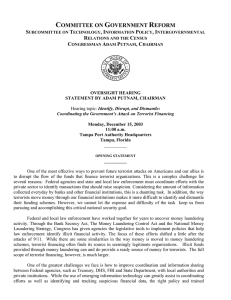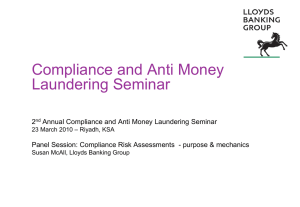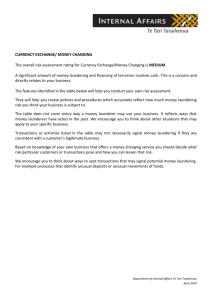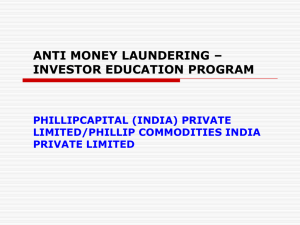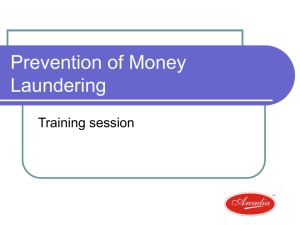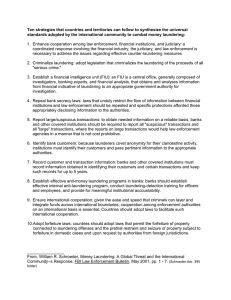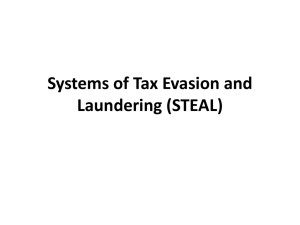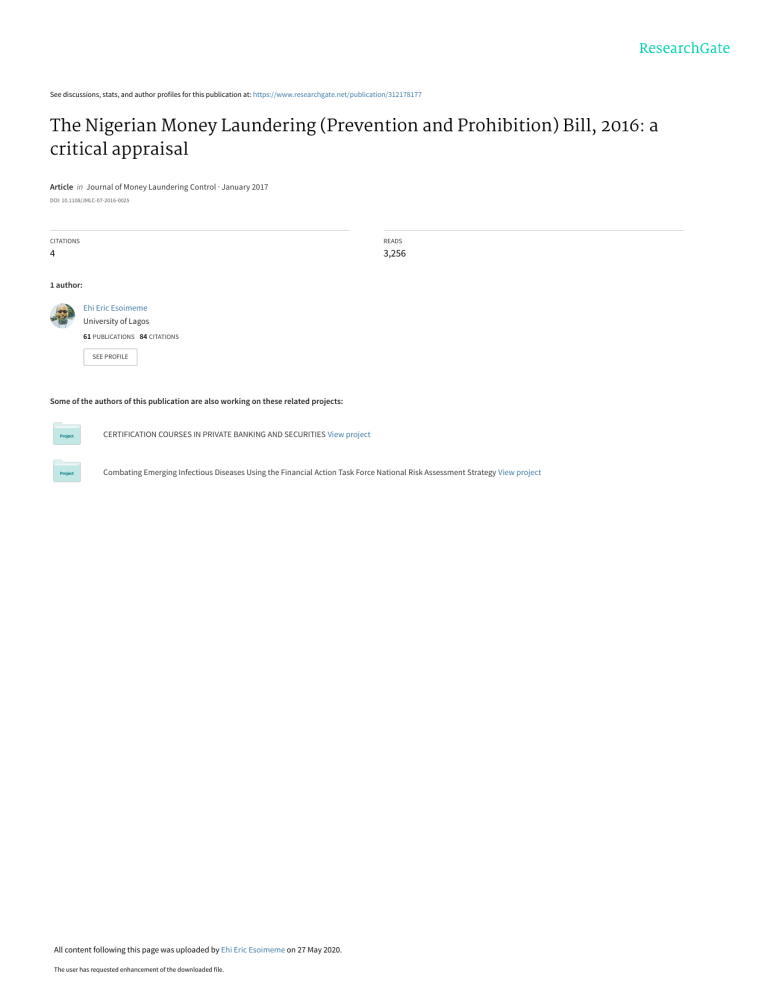
See discussions, stats, and author profiles for this publication at: https://www.researchgate.net/publication/312178177 The Nigerian Money Laundering (Prevention and Prohibition) Bill, 2016: a critical appraisal Article in Journal of Money Laundering Control · January 2017 DOI: 10.1108/JMLC-07-2016-0025 CITATIONS READS 4 3,256 1 author: Ehi Eric Esoimeme University of Lagos 61 PUBLICATIONS 84 CITATIONS SEE PROFILE Some of the authors of this publication are also working on these related projects: CERTIFICATION COURSES IN PRIVATE BANKING AND SECURITIES View project Combating Emerging Infectious Diseases Using the Financial Action Task Force National Risk Assessment Strategy View project All content following this page was uploaded by Ehi Eric Esoimeme on 27 May 2020. The user has requested enhancement of the downloaded file. TITLE OF THE ARTICLE: THE NIGERIAN MONEY LAUNDERING (PREVENTION AND PROHIBITION) BILL, 2016: A CRITICAL APPRAISAL AUTHOR: EHI ERIC ESOIMEME MANAGING PARTNER AT E-FOUR & AAF DEPUTY EDITOR IN CHIEF OF DSC PUBLICATIONS LTD. EMAIL ADDRESS: EHIESOIMEME@YAHOO.COM CORRESPONDING AUTHOR: EHI ERIC ESOIMEME AUTHOR OF THE BOOK: THE RISK-BASED APPROACH TO COMBATING MODERN SLAVERY AUTHOR OF THE BOOK: THE RISK-BASED APPROACH TO COMBATING MONEY LAUNDERING AND TERRORIST FINANCING AUTHOR OF THE BOOK: DETERRING AND DETECTING MONEY LAUNDERING AND TERRORIST FINANCING: A COMPARATIVE ANALYSIS OF ANTI–MONEY LAUNDERING AND COUNTERTERRORISM FINANCING STRATEGIES ACKNOWLEDGMENTS I would like to express my profound and sincere appreciation to Tom Brown CAMS, for impacting on me, the research skills needed to carry out this project. COMPETING INTERESTS I declare that I have no competing interests. ABSTRACT PURPOSE – This paper critically examines the Money Laundering (Prevention and Prohibition) Bill, 2016. Its aim is to determine the level of effectiveness of the preventive measures in the Bill. DESIGN/METHODOLOGY/APPROACH – The appraisal took the form of a desk study, which analyzed various documents and reports such as the Financial Action Task Force Recommendations 2012, Mutual Evaluation Reports conducted by the Inter-Governmental Action Group against Money Laundering in West Africa (GIABA) on Nigeria, the Judgment delivered by Justice Gabriel Kolawole of the Federal High Court Abuja and the United Kingdom’s national risk assessment of money laundering and terrorist financing. FINDINGS – This paper determined that the Bill could achieve its core objectives if the following recommendations are implemented: i. Section 15 of the Bill should be modified to include the definition of ‘Arrangement’. ii. Lawyers should be allowed to send their Suspicious Transaction Report (STR) to the Nigerian Bar Association, provided that there are appropriate forms of cooperation between the NBA and the Financial Intelligence Unit. This approach is in line with the Financial Action Task Force Recommendations. iii. The Bill should expressly prohibit retaliation by employers against whistleblowers and provide them with a private cause of action in the event that they are discharged or discriminated against by their employers. This approach is being adopted by the United States Dodd-Frank Act. iv. A request for customer information, by the Director-General of the Nigeria Financial Intelligence Centre, should be made pursuant to an order of the Federal High Court obtained upon an ex-parte application supported by a sworn declaration by an authorized officer of the Centre, justifying the request for customer information. ORIGINALITY/VALUE – This Article offers a critical appraisal of the Money Laundering (Prevention and Prohibition) Bill, 2016. The paper will identify the strengths and weaknesses of the Bill. This is the only article to adopt this kind of approach. KEYWORDS – Money Laundering, Terrorist Financing, Corruption 1. INTRODUCTION Nigeria had been described as one of the most corrupt countries in the world. Pervasive corruption in Nigeria constitutes a major threat and underlies most of the money laundering cases reported in recent time.1 Over the past 27 years, the Nigerian Government has committed itself to combating corruption and money laundering. In the 1980s, Nigeria took a bold initiative to enact the National Drug Law Enforcement Agency (NDLEA) Act, No.48 of 1989. This was to set the stage in confronting the menace of money laundering on economic activities, and to comply with the Vienna Convention. Again in 1994, the Government took another bold step to address bank failure, through checking the activities of money launderers and abuse by insiders in the banking sector, by promulgating the Failed Banks (Recovery of Debt and Financial Malpractice in Banks) Act of No 18 of 1994. Until then, a number of unpleasant developments in the banking industry were threatening to undermine confidence in and integrity of the financial system, through facilitating crime and corruption, as well as allowing criminally-minded Bank Directors and managers to retain and savour the rewards of their illegal actions.2 The third bold step was the promulgation of the Money Laundering Act of 1995, which criminalized money laundering - the first to do so in Africa. This law was, however, limited in scope as it covered money laundering offences related only to proceeds of drug trafficking. Thus, it was amended in 2004 to 1 The Inter-Governmental Action Group against Money Laundering in West Africa (GIABA) (2008), ‘Mutual Evaluation Report: Anti-Money Laundering and Combating the Financing of Terrorism’, Available at: http://www.giaba.org/media/f/299_Mutual%20Evaluation%20Report%20of%20Nigeria.pdf (accessed 2 January 2016). 2 Sanusi, J O. (2003), ‘Central Bank of Nigeria’s stand point of anti-money laundering compliance’, BIS Review 25/2003, p. 2. meet the requisite international standards, including provision for the establishment of a financial intelligence unit. Under the Money Laundering Prohibition Act (MLPA) 2004, predicate offences covered a wide-range of criminal conducts including financial malpractices, retention of proceeds of crime, corruption, conversion or the transfer of resources derived from narcotic drugs or any illegal act or crime.3 In 2009, the Financial Action Task Force (FATF) decided to subject Nigeria to a targeted review on account of the size of her financial system and poor ratings on 13 out of the 16 key/core recommendations of the FATF during the country’s 2007 Mutual Evaluation. In view of this fact, the Nigerian authorities constituted a high powered Presidential Inter Ministerial/Agency Committee on FATF in June 2009 to engage the FATF’s International Cooperation Review Group (ICRG) on Africa / Middle-East. The Committee had three face-to-face meetings with the ICRG as well as provided progress reports /responses to the ICRG prima facie review questionnaire. The committee facilitated the submission to the National Assembly of the amended Money Laundering Prohibition Act (MLPA), 2004 as an Executive Bill captioned MLP (A) 2009.4 Through the efforts of the Committee, the Bill was passed into law by the National Assembly in 2011.5 With this major development, the legal weaknesses in Nigeria’s anti-money laundering and counter-terrorist financing 3 The Inter-Governmental Action Group against Money Laundering in West Africa (GIABA) (2008), ‘Mutual Evaluation Report: Anti-Money Laundering and Combating the Financing of Terrorism’, Available at: http://www.giaba.org/media/f/299_Mutual%20Evaluation%20Report%20of%20Nigeria.pdf (accessed 2 January 2016). 4 The Inter-Governmental Action Group against Money Laundering in West Africa (GIABA) (2010), ‘Second Follow Up Report: Mutual Evaluation Nigeria’, Available at: http://www.giaba.org/media/f/797_2nd%20FUR%20Nigeria%20-%20English.pdf (accessed 4 January 2016). 5 The Inter-Governmental Action Group against Money Laundering in West Africa (GIABA) (2010), ‘Third Follow Up Report: Mutual Evaluation Nigeria’, Available at: http://www.giaba.org/media/f/811_3rd%20FUR%20Nigeria%20%20English.pdf (accessed 6 January 2016). (AML/CFT) regime, as contained in the country’s Mutual Evaluation Report were significantly addressed in line with international standard.6 In 2012, the Inter-Governmental Action Group against Money Laundering in West Africa (GIABA) reviewed Nigeria’s Money Laundering Prohibition Act 2011 and identified certain deficiencies in it. Nigeria was rated non-complaint by GIABA in the following: Customer Due Diligence, Supervision and Monitoring, Implementation of UN Instruments, Criminalizing Terrorist Financing, Freeze and Confiscate Terrorist Assets, Suspicious Transaction Reporting and International Cooperation.7 The Nigerian authorities taking into cognizance the observed deficiencies in the Money Laundering Prohibition Act 2011 engaged various competent authorities in Nigeria to address those areas of the laws that require amendments to ensure that country’s legislations on AML/CFT were in tandem with international standards and best practices. This led to the amendment of the Money Laundering Prohibition Act in 2012.8 Although the Money Laundering Prohibition Act 2011(as amended) sufficiently addressed observed weaknesses in Nigeria’s AML/CFT regime, particularly recommendations contained in Nigeria’s Mutual Evaluation Report as well as other AML/CFT international standards, it failed to provide for adequate measures that could prevent money laundering. 6 The Inter-Governmental Action Group against Money Laundering in West Africa (GIABA) (2012), ‘Fourth Follow Up Report: Mutual Evaluation Nigeria’, Available at: http://www.giaba.org/media/f/823_4th%20FUR%20Nigeria%20-%20English.pdf (accessed 8 January 2016). 7 The Inter-Governmental Action Group against Money Laundering in West Africa (GIABA) (2012), ‘Fourth Follow Up Report: Mutual Evaluation Nigeria, 2012’, Available at: http://www.giaba.org/media/f/823_4th%20FUR%20Nigeria%20-%20English.pdf (accessed 8 January 2016). 8 The Inter-Governmental Action Group against Money Laundering in West Africa (GIABA) (2013), ‘Fifth Follow Up Report: Mutual Evaluation Nigeria’, Available at: http://www.giaba.org/media/f/832_5th%20FUR%20Nigeria%20%20English.pdf (accessed 15 January 2016). In the past three years, more than fifteen ex- Governors, who were alleged to have embezzled public funds estimated at one hundred and seventy two billion naira have been arrested and charged to court.9 Against this backdrop, President Muhammadu Buhari had on the 27th of January, 2016 introduced a bill to the National Assembly to strengthen the war against corruption and money laundering.10 The bill is titled, “The Money Laundering (Prevention and Prohibition) Bill, 2016.” The Bill seeks to repeal the Money Laundering (Prohibition) Act, 2011 (as amended) and enact the Money Laundering (Prevention and Prohibition) Act to provide for measures for the prevention and prohibition of money laundering in Nigeria and for other related matters.11 The Money Laundering (Prevention and Prohibition) Bill, 2016 creates a single set of money laundering offences applicable throughout Nigeria to the proceeds of all crimes.12 It also creates a disclosure regime, which makes it an offence not to disclose knowledge or suspicion of money laundering,13 but also permits persons to be given consent in certain circumstances to carry out activities which would otherwise constitute money laundering.14 This paper critically examines the Money Laundering (Prevention and Prohibition) Bill, 2016, to determine the level of effectiveness of its preventive measures. 9 Oketola, D., Aborisade, S., Soriwei, F., Chiedozie, I., Adesomoju, A., Adeoye, G. and Ukandu, S. (2015), ‘N172bn fraud cases against ex-govs turned senators’, Available at: http://www.punchng.com/news/n172bn-fraud-casesagainst-ex-govs-turned-senators/ (accessed 16 May 2015). 10 Ameh, J. and Aborisade, S. (2016), ‘Buhari seeks stiffer penalty for money launderers’, Available at: http://www.punchng.com/buhari-seeks-stiffer-penalty-for-money-launderers/ (accessed 28 January 2016), see also Umoru, H. and Erunke, J. (2016), ‘NEW MONEY LAUNDERING BILL: 7-year prison term without option of fine awaits offenders’ Available at: http://www.vanguardngr.com/2016/02/new-money-laundering-bill-7-year-prisonterm-without-option-of-fine-awaits-offenders/ (accessed 27 February, 2016). 11 Money Laundering (Prevention and Prohibition) Bill, 2016, s. 1 12 Money Laundering (Prevention and Prohibition) Bill, 2016, s. 2, s. 3, s. 4 13 Money Laundering (Prevention and Prohibition) Bill, 2016, s. 5, s. 6 14 Money Laundering (Prevention and Prohibition) Bill, 2016, s. 2 (3) (a), s. 3 (2) (a), s. 4 (2) (a) The analysis will be done under nine subheadings: ‘Arrangements’, ‘Stiffer Penalties’, ‘Defences’, ‘Bureau for Money Laundering Control’, ‘Whistle Blower Protection’, ‘Lack of Clarity’, ‘Supervision of Legal Practitioners by the Bureau for Money Laundering Control’, ‘Job Security’ and ‘Excessive Powers of the Director General of the Centre’. 2. POSITIVE FEATURES OF THE MONEY LAUNDERING (PREVENTION AND PROHIBITION) BILL, 2016 This section identifies the positive features of the Money Laundering (Prevention and Prohibition) Bill, 2016. 2.1 ARRANGEMENTS The Money Laundering (Prevention and Prohibition) Bill hereinafter referred to as ‘The Bill’ provides for a new money laundering offence.15 According to Section 3 (1) of the Bill, A person commits an offence if he enters into or becomes concerned in an arrangement which he knows, ought reasonably to have known, or suspects, facilitates by whatever means, the acquisition, retention, use or control of property that has a criminal origin by or on behalf of another person. This offence potentially catches a large range of involvement in money laundering offences usually at the layering and integration stages. This is the offence which will often be apt for the prosecution of those who launder on behalf of others. Money laundering is heavily reliant on access to the professional skills of, among others, lawyers, estate agents, accountants, and company formation agents.16 15 Money Laundering (Prevention and Prohibition) Bill, 2016, s. 3 National Crime Agency (2015), ‘National Strategic Assessment of Serious and Organised Crime 2015’, Available at: http://www.nationalcrimeagency.gov.uk/publications/560-national-strategic-assessment-of-serious-andorganised-crime-2015/file (accessed 7 July 2016). 16 This offence is seen present in the United Kingdom’s money laundering law,17 and it has achieved great success in the prosecution of professionals who launder money on behalf of Nigerians. In the James Ibori case, for example, UK-based lawyer Bhadresh Gohil, a partner at a solicitors in St James’s, London, was jailed for 10 years for helping Ibori use a client account “as a private bank account”. Former banker and Harvard graduate Ellias Preko was sentenced to four and a half years for laundering money for Ibori.18 2.2 STIFFER PENALTIES The Bill provides appropriate penalties for anybody found culpable of the offence of Money Laundering. Unlike the Money Laundering (Prohibition) Act, 2011 (as amended) which made provision for a minimum sentence and a maximum sentence, the Bill only provides for a minimum sentence.19 This therefore means that an individual found guilty of the offence of money laundering could be liable on conviction to more than fourteen years imprisonment without the option of a fine. The above measure is in line with the Financial Action Task Force Recommendations (Recommendation 3) which requires that criminal sanctions for natural persons convicted of money laundering should be effective, proportionate and dissuasive. 17 United Kingdom Proceeds of Crime Act 2002 (as amended), s. 328 (1) Murchu, C O. (2015), ‘London’s money-laundering ‘enablers’ face crackdown’, Available at: http://www.ft.com/cms/s/0/a421beac-3ce7-11e5-8613-07d16aad2152.html#axzz3iLfi2VnX (accessed 9 August 2015). 19 An individual found guilty of a money laundering offence under the Bill will be liable on conviction for a term of not less than seven years without the option of a fine while a financial institution found guilty of the offence will be liable on conviction to a fine of not less than twenty-five million Naira. A designated non-financial business and profession, found guilty of a money laundering offence, will be liable on conviction to a fine of not less than ten million Naira. See section 8 of the Bill for more information on penalties. 18 The above measure could reduce the level of corruption in the country. Nigeria ranks 136 out of 176 countries with a score of just 26 out of 100 on the 2015 Corruption Perception Index released by Transparency International.20 2.3 DEFENCES The Bill provides for the new Defence of Authorised Disclosure. An offence under Section 2, 3 and 4 of the Bill is not committed if a person makes a report to a person authorised by the Director-General of the Nigeria Financial Intelligence Centre or to a designated officer by the person at risk of prosecution, that the property is, or is suspected to be property of a criminal origin, and if the report is made before he does any act referred to in Section 2, 3 and 4 of the Bill; he has the appropriate consent.21 The reports referred to above could assist law enforcement agencies in the fight against money laundering and the financing of terrorism. By reporting suspicious and unusual transactions, businesses will minimise the risk of the proceeds of crime in the country’s financial system. 22 This can lead to a safer business operating environment. Crime and money laundering risk can be minimised when businesses take necessary measures to recognise suspicious and unusual transactions. 20 Transparency International (2015), ‘Corruption Perceptions Index 2015’, Available at: http://www.transparency.org/cpi2015 (accessed 3 March 2016). 21 Money Laundering (Prevention and Prohibition) Bill, 2016, s. 2 (3) (a), s. 3 (2) (a), s. 4 (2) (a) 22 The Defence of Authorised Disclosure is also present in the United Kingdom’s Proceeds of Crime Act 2002 (as amended) via s. 327 (2) (a), s. 328 (2) (a) and s. 329 (2) (a). Since the creation of the regime through legislation, there has been considerable change in the UK economic crime environment and the world as a whole. See National Crime Agency (2015), ‘Suspicious Activity Reports (SARs) Annual Report 2015’, Available at: http://www.nationalcrimeagency.gov.uk/publications/677-sars-annual-report-2015/file (accessed 7 July 2016). 2.4 BUREAU FOR MONEY LAUNDERING CONTROL The Bill dissolves the Special Control Unit against Money Laundering23 and establishes the Bureau for Money Laundering Control (in this paper referred to as "the Bureau") which shall be responsible for the supervision 'of designated non-financial businesses and professions in their compliance with the Bill and associated regulations.24 Unlike the Special Control Unit against Money Laundering which was established by the Federal Ministry of Commerce and Industry (now Federal Ministry of Industry, Trade & Investment) to supervise, monitor and regulate Designated non-financial institutions as regards compliance with the Money Laundering (Prohibition) Act, 2011 (as amended), the Bureau was established by the Bill as a body corporate with perpetual succession and a common seal which may sue and be sued in its corporate name.25 The above measure could help reduce the risk posed by Accountancy Service Providers and Legal Service Providers. Although Nigeria is yet to conduct its own National Risk Assessment, the United Kingdom’s national risk assessment of money laundering and terrorist financing warned that the country’s banking, accountancy and legal services sectors were at a high risk of exposure to handling corrupt money.26 Also, a massive leak of documents from the Panamanian law firm, Mossack Fonseca, show that banks, law firms and other offshore players have often failed to follow legal requirements that they make sure their clients are not involved in criminal enterprises, tax dodging or political corruption. In some 23 Money Laundering (Prevention and Prohibition) Bill, 2016, s. 49 (1) Money Laundering (Prevention and Prohibition) Bill, 2016, s. 35 (1) 25 Money Laundering (Prevention and Prohibition) Bill, 2016, s. 35 (2) 26 HM Treasury (2015), ‘UK national risk assessment of money laundering and terrorist financing’, Available at: https://www.gov.uk/government/uploads/system/uploads/attachment_data/file/468210/UK_NRA_October_2015 _final_web.pdf (accessed 17 October 2015). 24 instances, the files show, offshore middlemen have protected themselves and their clients by concealing suspect transactions or manipulating official records.27 More than 30 years after the infamous raid on the Brink’s-Mat depot near Heathrow, new information shows how the robbers’ main money launderer tried to cling on to some of the proceeds with the help of the Panamanian law firm Mossack Fonseca and its co-founder, Jürgen Mossack. Faxes, memos and company filings from deep in the firm’s archives show how, in the late 1980s, Jürgen Mossack played a vital role in advising – unwittingly at first – fugitive money launderer Gordon Parry.28 2.5 WHISTLE BLOWER PROTECTION The Bill provides protection for any person who makes a disclosure of information where that person has reasonable cause to believe that another person is engaged in money laundering.29 In other words, No action, whether criminal or civil, lies against a financial institution, designated nonfinancial business and profession, supervisory body, the Federal Inland Revenue Service or any other person complying in good faith with a provision of Part II of the Bill, including any director, employee or other person acting on behalf of the financial institution, designated non-financial business and profession, supervisory body, the Federal Inland Revenue Service or any other person.30 27 Obermayer, B., Ryle, G., Guevara, M W., Hudson, M., Bernstein, J., Fitzgibbon, W., Cabra, M., Hamilton, M M., Obermaier, F., Chittum, R., Diaz-Struck, E., Carvajal, R., Schilis-Gallego, C., Garcia Rey, M., Reuter, D., Galizia, MC., Boland-Rudder, H., Fiandor, M. and Torres, M., ‘Giant Leak of Offshore Financial Records Exposes Global Array of Crime and Corruption’, Available at: https://panamapapers.icij.org/20160403-panama-papers-globaloverview.html (accessed 7 July 2016). 28 Theguardian (2016), ‘How Mossack Fonseca helped hide millions from Britain’s biggest gold bullion robbery’, Available at: https://www.theguardian.com/news/2016/apr/04/brinks-mat-how-mossack-fonseca-helped-hidemillions (accessed 7 April 2016). 29 Money Laundering (Prevention and Prohibition) Bill, 2016, s. 14 30 Money Laundering (Prevention and Prohibition) Bill, 2016, s. 14 (1) A person who has made, initiated or contributed to a report under sections 11, 12, 16, 17 or 18 of the Bill or who has furnished additional information concerning a report or the grounds for a report under any provision of Part II of the Bill is competent, but not compellable, to give evidence in criminal proceedings arising from the report.31 This protection was not provided in the Money Laundering (Prohibition) Act, 2011 (as amended). The above measure could assist law enforcement agencies in the prosecution of crime and in the deprivation of the proceeds and instrumentalities of crime. The ability of law enforcement agencies to conduct financial investigations and have access to financial and other information is essential to effectively combating Money Laundering, associated predicate offences and Terrorist Financing offences. Such investigations will often establish the existence of otherwise unknown crimes and assets that have been purchased with proceeds of criminal activity, thus allowing these assets to become subject to confiscation. The U.S. Securities and Exchange Commission, for example, has scored big enforcement successes and delivered millions of dollars in awards to whistleblowers under a program from the 2010 Dodd-Frank overhaul of Wall Street.32 31 Money Laundering (Prevention and Prohibition) Bill, 2016, s. 14 (2) Engler, H. (2014), ‘BNP case spurs calls for whistleblower incentives in banking’, Available at: http://www.reuters.com/article/banking-whistleblower-idUSL2N0PT1CZ20140721 (accessed 26 July 2014). 32 3. NEGATIVE FEATURES OF THE MONEY LAUNDERING (PREVENTION AND PROHIBITION) BILL, 2016 This section identifies the negative features of the Money Laundering (Prevention and Prohibition) Bill, 2016. 3.1 LACK OF CLARITY An arrangement is not defined in Part II of the Bill. Although it can be implied that Section 15 Subsection 14 of the Bill may have listed transactions that qualify as an arrangement, the information provided is limited to legal practitioners. It does not cover other professionals. The above lacuna could be exploited by corrupt institutions who intend laundering money through the structure in place. 3.2 SUPERVISION OF LEGAL PRACTITIONERS BY THE BUREAU FOR MONEY LAUNDERING CONTROL The Bill failed to take into cognizance the Judgment delivered by Justice Gabriel Kolawole of the Federal High Court Abuja, where he declared as invalid, unconstitutional and illegal the directive by the Special Control Unit against Money Laundering that lawyers should report to it certain transactions relating to their clients.33 The directive was said to be hinged on the provisions of Section 5 of the Money Laundering (Prohibition) Act 2011. The defendants in the suit are the Attorney-General of the Federation and the Central Bank of Nigeria. The court held in its judgment that sections 5 and 25 of the Money Laundering (Prohibition) Act 2011 sought to impose sanctions on legal practitioners, who flouted the provisions contrary to the provisions of the Legal Practitioners Act, the Rules of Professional Conduct for Legal Practitioners, and Section 192 of the Evidence Act.34 The Bill is likely to be challenged by the Nigerian Bar Association, once it becomes law, and a similar verdict like the one delivered by Justice Kolawole may be reached. 3.3 JOB SECURITY While the Bill protects whistleblowers from any criminal or civil action, it does not expressly prohibit retaliation by employers against whistleblowers and it does not provide employees with a private cause of action in the event that they are discharged or discriminated against by their employers. 33 Adesomoju, A. (2014), ‘NBA wins suit on disputed anti-money laundering provisions’, Available at: http://www.punchng.com/feature/the-law-you/nba-wins-suit-on-disputed-anti-money-laundering-provisions/ (accessed 1st of January, 2015). 34 Adesomoju, A. (2014), ‘NBA wins suit on disputed anti-money laundering provisions’, Available at: http://www.punchng.com/feature/the-law-you/nba-wins-suit-on-disputed-anti-money-laundering-provisions/ (accessed 1st of January, 2015). 3.4 EXCESSIVE POWERS OF THE DIRECTOR GENERAL OF THE CENTRE Section 22 of the Bill confers on the Director-General of the Nigeria Financial Intelligence Centre (in this paper referred to as "the Centre"), the power to access customer information.35 According to Section 22, the Director-General of the Centre can mandate a financial institution to supply customer information and customer details to the Centre36 if the person for whom customer information or customer details are required is, directly or indirectly, the subject of an intelligence enquiry by the Centre; and the information or details are sought for the purpose of the enquiry.37 It is worth noting that the Bill does not require the Director-General of the Centre to justify a request for customer information before a Court of Law, as was required by Section 13 (1) of the Money Laundering Prohibition Act 2011 (as amended). The absence of judicial review of customer information requests could leave room for abuse. The Director-General may request for information, even when the individual concerned is not the subject of an intelligence inquiry by the Centre. The above may lead to an unnecessary interference with a person’s right to a private life, and such interference cannot be justified.38 35 Money Laundering (Prevention and Prohibition) Bill, 2016, s. 22 Money Laundering (Prevention and Prohibition) Bill, 2016, s. 22 (1) 37 Money Laundering (Prevention and Prohibition) Bill, 2016, s. 22 (2) 38 The privacy of citizens, their homes, correspondence, telephone conversations and telegraphic communications is guaranteed and protected by s. 37 of the Constitution of the Federal Republic of Nigeria, 1999. For more on this, see Niemietz v. Germany (1993) 16 EHRR 97, Para 27, see also Evans v. United Kingdom (2008) 46 EHRR 34, Para 71. See Dudgeon v. United Kingdom (1982) 4 EHRR 149, Para 43, see also Pretty v. UK (2002) 35 EHRR 1 para 61 36 4. CONCLUSION This paper critically examined the Money Laundering (Prevention and Prohibition) Bill, 2016. It identified the strengths and weaknesses of the Bill. This section focuses on those areas that need reform. Based on the arguments canvassed in Section 2 and 3 of this paper, the following reforms to the Money Laundering (Prevention and Prohibition) Bill, 2016 are recommended: 1. Section 15 of the Bill should be modified to include the definition of ‘Arrangement’. 2. Lawyers should be allowed to send their Suspicious Transaction Report (STR) to the Nigerian Bar Association, provided that there are appropriate forms of cooperation between the NBA and the Financial Intelligence Unit. This approach is in line with the International Standards on Combating Money Laundering and the Financing of Terrorism and Proliferation (the FATF Recommendations)’, Interpretive Note to Recommendation 23.39 3. The Bill should expressly prohibit retaliation by employers against whistleblowers and provide them with a private cause of action in the event that they are discharged or discriminated against by their employers. This approach is being adopted by the United States Dodd-Frank Act. Alternatively, the Bill could offer incentives to encourage whistleblowing in the financial sector. In Europe, a few countries offer incentives for whistleblowing in certain sectors. In Hungary, for example, anti-trust law qualifies whistleblowers for up to 1% of the fine collected from the employer capped at around 160,000 Euros. Historically, the United States of America has offered incentives to encourage whistleblowing in the financial sector. The False Claims Act (FCA) 1863, which prohibits fraud on the Government, allows individuals to bring claims on behalf of the Government. Successful claimants are eligible 39 The Interpretive Note to Recommendation 23 of the Financial Action Task Force (FATF) Recommendations is to the effect that Countries may allow lawyers, notaries, other independent legal professionals and accountants to send their Suspicious Transaction Report (STR) to their appropriate self-regulatory organisations, provided that there are appropriate forms of cooperation between these organisations and the Financial Intelligence Unit (FIU). for a percentage of the amount recovered. More recently, the Dodd-Frank Act 2010 offers similar rewards for reporting securities violations. 4. A request for customer information, by the Director-General of the Centre, should be made pursuant to an order of the Federal High Court obtained upon an ex-parte application supported by a sworn declaration by an authorized officer of the centre, justifying the request for customer information. ABOUT THE AUTHOR Ehi Eric Esoimeme's skill and knowledge in the field of the financial crime space is drawn from his many years of experience as a researcher in anti-money laundering laws and policies, counter-fraud measures and anti-corruption strategies. So far, Ehi has authored more than 25 publications, including six books on Money Laundering Law/Banking Law. Ehi Eric Esoimeme's second book titled ‘The Risk-Based Approach to Combating Money Laundering and Terrorist Financing’ became a bestseller on Amazon for banking law. Ehi's fourth book titled ‘Deterring and Detecting Money Laundering and Terrorist Financing: A Comparative Analysis of Anti– Money Laundering and Counterterrorism Financing Strategies’ has received many commendations from both academic researchers and Anti-Money Laundering professionals. Ehi Eric Esoimeme's law firm, E-Four and AAF offers consultation services to financial institutions and designated non-financial institutions on anti-money laundering compliance. They critique anti-money laundering policies to identify areas that need reforms and proffer recommendations where necessary. E-Four and AAF also offers consultation on the most relevant regional approaches to confronting financial crime, and the current regulatory environment and priority areas addressing and/or attempting to combat fraud and money laundering as well as other financial crimes. Ehi Eric Esoimeme is now part of the largest community of frontier market experts. He is available for calls via OnFrontiers: https://onfrontiers.com/profile/eesoimeme. For more information on Ehi’s books, visit https://www.amazon.com/Ehi-Eric-EsoimemeEsq/e/B00OESQ4VS EHI ERIC ESOIMEME’S PUBLICATIONS BOOKS • Esoimeme, E.E. (2019),’The Risk-Based Approach to Combating Modern Slavery’, DSC Publications Ltd, Available on Amazon: https://www.amazon.co.uk/Risk-Based- Approach-Combating-ModernSlavery/dp/9782787914/ref=sr_1_fkmr0_1?keywords=ehi+esoimeme&qid=1569793632 &s=gateway&sr=8-1-fkmr0 • Esoimeme, E.E. (2019), ‘Balancing Anti-Money Laundering/Counter-Terrorist Financing Requirements and Financial Inclusion: The Case of Telecommunications Companies’, DSC Publications Ltd, Available on Amazon: https://www.amazon.co.uk/Balancing-AntiMoney-Laundering-Counter-TerroristRequirements/dp/9782787892/ref=sr_1_1?keywords=esoimeme&qid=1559731958&s= gateway&sr=8-1 • Esoimeme, E.E. (2018), ‘Deterring and Detecting Money Laundering and Terrorist Financing: A Comparative Analysis of Anti–Money Laundering and Counterterrorism Financing Strategies’, DSC Publications Ltd, Available Amazon: https://www.amazon.co.uk/Deterring-Detecting-Laundering-TerroristFinancing/dp/9782787795/ref=sr_1_1?ie=UTF8&qid=1520869556&sr=81&keywords=ehi+esoimeme on • Onwudiwe, C.C. and Esoimeme, E.E. (2016), ‘Banker-Customer Relationship: A Practical Legal Guide’, Bank Customers Association of Nigeria. • Esoimeme, E.E. (2015), ‘The Risk-Based Approach to Combating Money Laundering and Terrorist Financing’, Eric Press; Available on Amazon: https://www.amazon.co.uk/RiskBased-Combating-Laundering-TerroristFinancing/dp/9789486030/ref=sr_1_2?ie=UTF8&qid=1437508453&sr=82&keywords=ehi+eric+esoimeme • Esoimeme, E.E. (2014), ‘A Comparative Study of the Money Laundering Laws/Regulations in Nigeria, the United States and the United Kingdom’, Eric Press; Available on Amazon: https://www.amazon.co.uk/dp/9782787906 View publication stats
